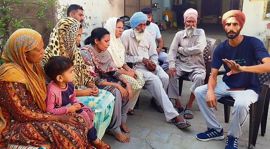
In India, 56.4 per cent of the total disease burden is due to unhealthy dietary practices, stated the Dietary Guidelines for Indians developed by the Indian Council of Medical Research-National Institute of Nutrition (ICMR-NIN), Hyderabad.
Aksheev Thakur
New Delhi, May 8
In India, 56.4 per cent of the total disease burden is due to unhealthy dietary practices, stated the Dietary Guidelines for Indians developed by the Indian Council of Medical Research-National Institute of Nutrition (ICMR-NIN), Hyderabad. It also said healthy dietary habits could reduce a substantial proportion of coronary heart disease and hypertension, and prevent type 2 diabetes.
Expressing concern over malnutrition and obesity, ICMR-NIN discouraged the consumption of packaged foods and foods containing excess oil, salt, sugar and added colours. It also linked the use of excessive use of mobile phones with obesity.
“Inadequate and improper sleeping habits, along with excessive use of mobile phones, is strongly associated with weight gain in childhood, adolescence and adulthood,” it said. The guidelines discouraged the intake of pizza, cookies, ‘samosas’ and pastries, which have higher content of oil, sugar and fat.
“About 25 per cent of Indians are either overweight or obese. Unhealthy, highly processed, high fat, sugary and salty food items have become more affordable and accessible than the healthier alternatives. Consume adequate quantities of nuts, oil seeds, fatty fish and restrict cooking oils to 25 gm to 30 gm per day,” it said.
The guidelines say there is a tendency to gain weight mostly around 20 years of age, and among women after childbirth because of less physical activity and excess calorie intake. “Obesity is also rapidly increasing among children and adolescents and therefore, one should be watchful during these periods. Regular yoga and physical activity are essential. Increase the consumption of fruits, vegetables and legumes. Prefer whole grains and millets over refined grains/ultra-processed foods,” it said.
In order to maintain appropriate weight and waist circumference, the guidelines recommend that one must include fresh vegetables in every meal and consume whole grains, pulses and beans. Sugar, processed products, fruit juices and saturated foods should be avoided, it said.
“Weight reduction should be gradual. Weight reduction diets should not be less than 1000 Kcal/day and should provide all nutrients. A reduction of half a kilogramme body weight per week is considered safe. Approaches of rapid weight loss and use of anti-obesity drugs should be avoided,” it recommended.
“The dietary habits of Indians have undergone significant changes over the past few decades, leading to an increase in the prevalence of non-communicable diseases. Problems of undernutrition continue to persist. I am pleased that these guidelines have been made relevant to the changing food scenario in India with addition of practicable messages and suggestions on handling food safety, choosing minimally processed foods, importance of food labels and physical activity,” said Dr Rajiv Bahl, secretary, Department of Health Research and Director General, ICMR.
The guidelines have been drafted by a multi-disciplinary committee of experts under the chairmanship of Dr Hemalatha R, Director, ICMR-NIN.
“Through the dietary guidelines, we emphasise that the most logical, sustainable, and long-term solution to all forms of malnutrition is ensuring the availability, accessibility, and affordability of nutrient-rich foods while promoting consumption of diverse foods,” said Dr Hemalatha.
Cut salt, consume veggies
- Ensure provision of extra food and healthcare during pregnancy and lactation
- Ensure exclusive breastfeeding for the first six months and continue breastfeeding till two years and beyond
- Start feeding homemade semi-solid complementary foods to the infant soon after six months of age
- Guarantee adequate and appropriate diets for children and adolescents both in health and sickness
- Eat plenty of vegetables and legumes
- Be physically active and exercise regularly
- Restrict intake of high fat, sugar, salt and ultra-processed foods
Join Whatsapp Channel of The Tribune for latest updates.




























